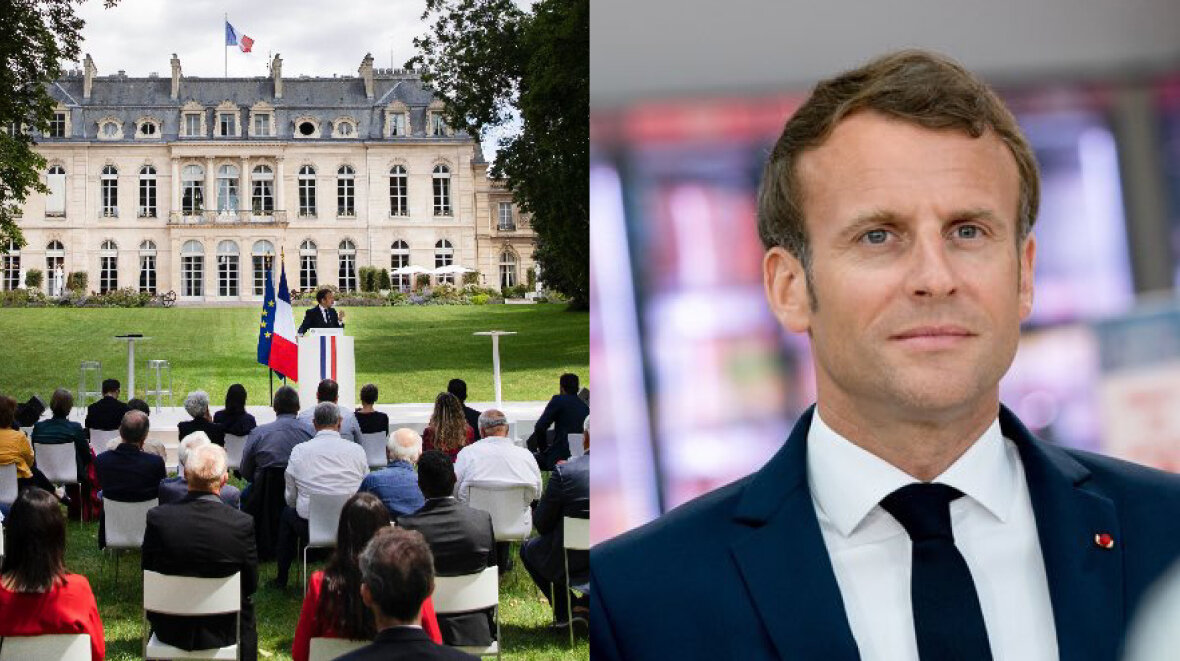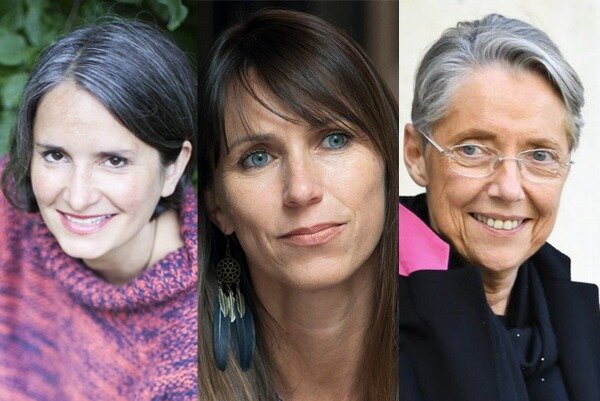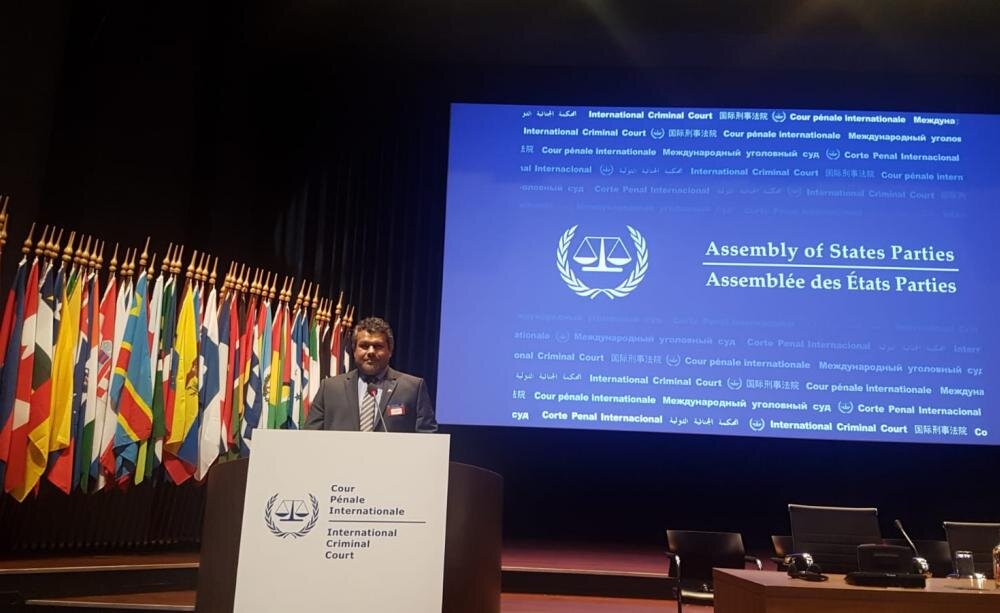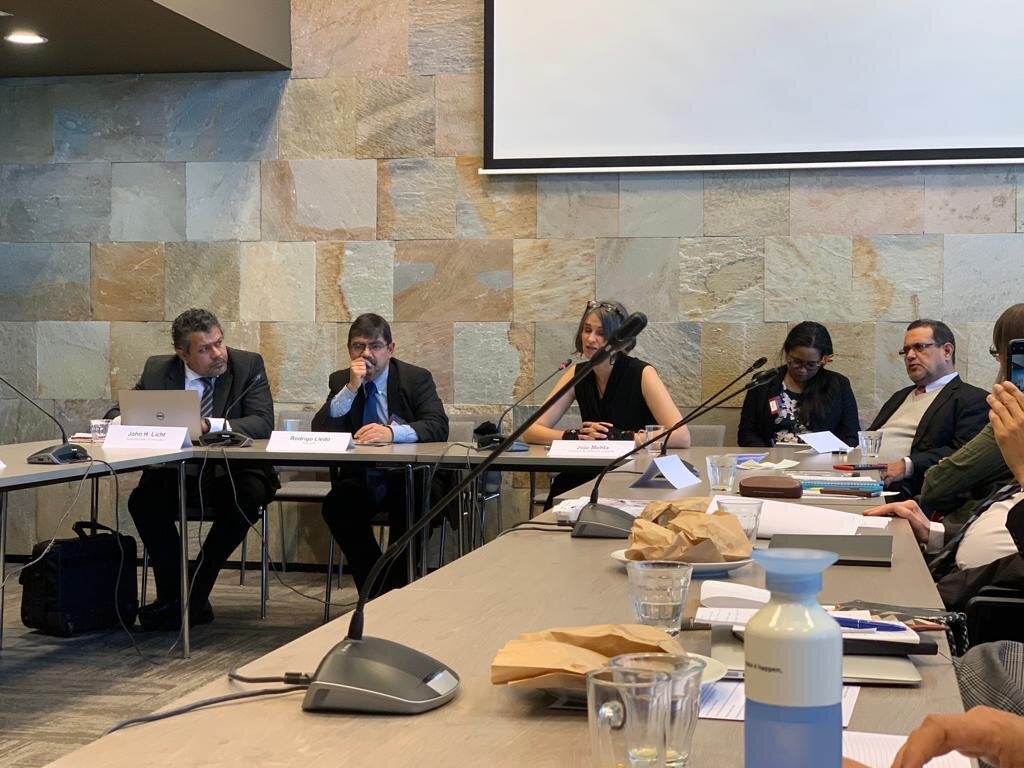President Macron “shares ambition” to establish international crime of ecocide
President Macron “shares ambition” to establish international crime of ecocide
French head of state’s response to citizens assembly opens way to legal protection of the Earth
President Emmanuel Macron of France met the 150 randomly selected members of the citizens assembly on climate, the Convention Citoyenne pour le Climat (CCC) this morning in the gardens of the Elysée Palace in Paris to give his response to the assembly’s proposals to tackle climate change.
Foremost among these was the proposal, supported by 99.3% of the assembly, that a new crime of ECOCIDE be established in France. Macron stopped short of accepting the exact text proposed, but clearly endorsed the principle. He assured the citizens of his support:
“We'll study, with you and legal experts, how this principle can be incorporated into French law."
Moreover he specifically promised to champion, on behalf of France, the enshrining of ecocide crime in international law.
“As for ecocide, I think I was the first leader to use that term when the Amazon was burning," the head of state said. "So I share the ambition that you defend … the mother of all battles is international: to ensure that this term is enshrined in international law so that leaders … are accountable before the International Criminal Court.”
Jojo Mehta, co-founder of the Stop Ecocide campaign which advocates for exactly this, said:
“This is hugely significant. Macron is the first leader of a wealthy industrial nation – one of the G7 – to support an international crime of ecocide. Let’s hold him to it, and look to other countries to follow his example. This conversation is not going to go away.”
She continued: “Making ECOCIDE a crime will change the ground rules, closing the door to the destructive practices that have brought us to climate and ecological emergency… and paving the way for healthier, safer ways of operating. It’s the bridge to a world where nature and humanity are both protected and can begin to recover – together.”
Valérie Cabanes, established voice for ecocide law in France, legal expert and close associate of the Stop Ecocide campaign, is resolute:
“We take Emmanuel Macron at his word concerning his wish to fight for the recognition of the crime of ecocide at the International Criminal Court on behalf of France. He says he shares our ‘emotion faced with those who destroy entire ecosystems with "full knowledge of the facts and with impunity".’ Mr President, we expect you to stick to your words! In the meantime: Thank you!”
French citizens’ assembly votes to make ecocide a crime
French citizens’ assembly votes to make ecocide a crime
Over 99% in favour of ecocide crime, 63% for a national referendum on it.
Pictured above: Jojo Mehta, co-founder Stop Ecocide, Valérie Cabanes, international law expert (human rights), Élisabeth Borne, French Minister for Ecological Transition
Following the “gilets jaunes” crisis last year, President Macron convened a “citizen’s climate assembly” – the Convention Citoyenne pour le Climat (CCC) of 150 randomly selected French citizens – and gave them a mandate to discuss and propose policies for addressing the climate crisis.
The CCC has just voted on its final proposals. Foremost among these is a crime of ecocide, intended to remove the impunity of big polluters acting in full knowledge of the risks to ecosystems. The crime is defined using the concept of “planetary boundaries”, developed by the Stockholm Resilience Institute and influential in the drafting of the UN’s Sustainable Development Goals. The framework lists nine connected “planetary boundaries” (eg CO2 levels, ocean acidification, biosphere integrity) beyond which we cannot go without risking irreversible damage to the Earth’s ability to sustain human life.
Valérie Cabanes, lawyer, activist and established voice for ecocide law in France and beyond, presented to the CCC in January the law proposal for which she had previously been lobbying. Inspired by the work of late British lawyer Polly Higgins, Cabanes has dedicated many years to legally enshrining the protection of nature. She is thrilled:
“The approval of the Citizen's Climate Convention reflects and speaks for a French population ready to adopt a law that respects the Earth’s ecosystems. The CCC also proposed that this law be decided via referendum, to avoid censure by parliament - letting the French population choose their own destiny: living in harmony with nature and protecting future generations - or not. It’s a symbolic and powerful step. Now we wait for our leaders to listen - and act in accordance with the proposals.”
Jojo Mehta, co-founder with Higgins’ of the Stop Ecocide campaign, works closely with Cabanes and others around the world to progress a crime of ecocide at the International Criminal Court. She said today:
“The news from France is phenomenal. It clearly demonstrates that citizens feel the urgent need for an enforceable deterrent to prevent ecosystem destruction. We trust the French government will respond positively and step up at the national level – even take the opportunity to lead at the international level, where Macron has already stated he believes this crime belongs (*20h04 in the timeline). The ball is already rolling… climate-vulnerable states we have been working with have called for ecocide crime to be considered at the International Criminal Court in the Hague. This vote is a huge pointer for France to move in the right direction, and will undoubtedly inspire other countries.”
Elisabeth Borne, the French Minister for Ecological Transition, has said she is in favour of the proposal and will meet with the citizens’ assembly tomorrow Monday 22nd. President Macron is due to meet with them a week later on the 29th.
Pictured above:
Valérie Cabanes, international law expert (human rights)
Élisabeth Borne, French Minister for Ecological Transition
Jojo Mehta, co-founder Stop Ecocide
Maldives calls for a fifth international crime of ecocide
Maldives calls for a fifth international crime of ecocide
"Please find below a press release from the Maldives government, which we are sharing on their behalf."
The Republic of Maldives, in its official statement to the Assembly of States Parties in The Hague has asserted its support for a fifth international crime of ecocide. The statement issued by the island nation, which has been a State Party to the Rome Statute of the International Criminal Court (ICC) since 2011, read; “We believe the time is ripe to consider an amendment to the Rome Statute that would criminalise acts that amount to ecocide.”
The statement was issued by Mr. Ahmed Saleem, Member of Parliament and Chair of the Parliamentary Standing Committee on Climate Change and Environment. In it he emphasized the life-or-death situation faced by his people and was critical of the lack of international action on climate change. “A decade has passed since we reminded the Security Council that a mean sea-level rise of two metres would suffice to virtually submerge the entire Maldives under water. Yet, we see no serious efforts on the part of large emitting countries to save humanity from the impending climate change catastrophe. We see little or no concrete action at multilateral level to bring about transformative changes necessary to prevent the repercussions of climate change. We are gravely concerned that this inaction will ultimately lead to the death of nations such as ours.”
The Maldives, a low laying island nation of about 1200 islands in the middle of Indian Ocean, has long been a strong advocate on climate change issues. Its serious concern over the impact of climate change was brought to global attention a decade ago, in 2009, when the country’s then President, Mohamed Nasheed, together with his cabinet ministers, held the world’s first underwater cabinet meeting. This was, a symbolic cry for help over rising sea levels that causes an existential threat to the tropical archipelagic nation.
Maldives has been reiterating the urgent need to act swiftly on the issue of climate change at many international forums. Its government remains steadfast in addressing climate change issues and bringing the matter to the international frontline. At the Blue Leaders Call to Action on Ocean and Climate, held in New York this September, President Ibrahim Mohamed Solih strongly urged world leaders to support the conclusion of a robust new international agreement in 2020, for the conservation and management of high seas to prevent adverse environmental effects.
Highlighting the impact of climate change and its long term effect and threat to humanity, the country’s Foreign Minister, Abdulla Shahid, in a statement given to Climate Diplomacy, reminded the world that, small island states may be the first to feel the impacts of climate change, but should we fail to unite in this fight, its impacts will reach bigger, more developed countries.
Noting his disappointment with the speed in which international communities are dealing with climate action, Hon. Ahmed Saleem remarked during this week’s Assembly: “My country, along with other environmentally vulnerable states has waited a long time, hoping that concrete steps will be taken at an international level to address this imminent climate emergency which our people face.” He further noted that “it is time justice for climate change victims be recognised as part and parcel of the international criminal justice system.”
The Maldives’ full statement is visible on the ICC website
IMAGE Mr. Ahmed Saleem, Member of Parliament and Chair of the Parliamentary Standing Committee on Climate Change and Environment.
Vanuatu calls for internatioal criminal court to seriously consider recognising crime of ecocide
Vanuatu calls for International Criminal Court to seriously consider recognizing crime of ecocide
On 3rd December 2019 in The Hague, at the International Criminal Court (ICC)’s annual Assembly of States Parties, the Pacific island state of Vanuatu made a bold statement - that the Assembly should consider seriously expanding the court's remit to include a crime of ecocide.
Ambassador John Licht of Vanuatu, speaking on behalf of his government to the full plenary session of the Assembly, declared: "An amendment of the Rome Statute could criminalise acts that amount to ecocide. We believe this radical idea merits serious discussion."
This came in the context of Vanuatu’s declared commitment to universal justice for the most serious crimes, and also the observation that sea level rise and other impacts of climate change continue to compromise Vanuatu’s ability to achieve sustainable development under the 2030 SDG Agenda.
Exploring justice for mass destruction to the natural environment and effects of global warming, Vanuatu’s official statement suggested that the Assembly of States Parties is supremely well positioned to consider averting climate catastrophe and securing reparation for victims through the international courts system.
The statement continued: “Science indicates that global warming is real and will only get worse and catastrophic if we do not achieve the rapid and far-reaching transformations necessary to keep temperature below 1.5 degrees. Therefore resolving to strengthen the international rule of law to protect our common heritage and environment could be our joint legacy.”
This is the first time since 1972 that a state representative has formally called for ecocide to be recognised at an international forum of such representatives. The last person to do so was Swedish premier Olof Palme in 1972 at the UN Stockholm Conference on the Human Environment where he described the air and oceans as a shared environment towards which we all must have a duty of care, declaring that "ecocide... requires urgent international attention"
Ambassador Licht remarked after giving his speech: "We need to construct a strong bridge between science and legal pathways to explore how best the State Parties through their relevant international institutions could commence discussions on finding a legal recourse to the ongoing destruction of the natural environment and the Earth’s climate system – what we refer to as Ecocide.
“Vanuatu is not alone in the climate crisis”, he continued. “Societies around the world are facing similar challenges that continue to take lives and destroy economic wealth of affected regions at an unprecedented scale. Vanuatu believes that the ICC’s Assembly needs to remain relevant in the face of the greatest threats to human rights in the history of mankind – it needs to seriously consider amendments to have ecocide as the fifth crime under the Rome Statute.”
The official statement to full Assembly came shortly after a side event hosted by the Republic of Vanuatu on "Investigating & Prosecuting Ecocide: the current and future role of the ICC". The event was chaired by Ambassador Licht and featured Pacific speakers from Tuvalu and new ICC member state Kiribati, whose accession to the ICC’s Rome Statute took place just last month following a key roundtable meeting in Vanuatu’s capital Port Vila earlier this year. Also speaking were lawyers from France and Chile, international criminal barrister Richard Rogers and Stop Ecocide's co-founder Jojo Mehta.
Jojo Mehta said: "The panel event was full and the atmosphere charged. This is an idea whose time has not only come, it's long overdue. It's committed and courageous of Vanuatu to take the step of openly calling for consideration of a crime of ecocide, and it was clear from the response today that they will not be alone. The political climate is changing, in recognition of the changing climate. This initiative is only going to grow - all we are doing is helping to accelerate a much-needed legal inevitability."
Read official statement here
Images:
1. On the podium: Ambassador John Licht making Vanuatu's official statement.
2. Side event on ecocide left to right: Ambassador John Licht of Vanuatu; Rodrigo Lledó, Chilean lawyer; Jojo Mehta, director of Ecological Defence Integrity and co-founder of Stop Ecocide campaign; Losaline Teo, Crown Counsel of Tuvalu; Natan Brechtefeld Teewe, Former Minister of Justice, Kiribati
EDITORS NOTES:
Vanuatu is a Pacific island state made up of around 80 islands and has been designated the world's most climate vulnerable state. The small Republic with a population of 270,000 is a leading voice in the region and already last year publicly stated its willingness to take legal routes to pursue climate justice and compensation for climate damage.
Ecological Defence Integrity is a UK non-profit founded in 2017 by environmental campaigner Jojo Mehta and legal pioneer the late Polly Higgins (1968-2019), to support the establishment of ecocide as a crime at the International Criminal Court. To crowdfund for this they launched the public-facing campaign Stop Ecocide, where supporters declare themselves Earth Protectors and contribute to a globally validated Trust Fund.
Pope francis: destroying the earth is a sin and should be a crime.
Pope Francis: Destroying the Earth is a sin and should be a crime.
Addressing the International Association of Penal Law in the Vatican on 15th November 2019, Pope Francis proposed that “sins against ecology” be added to the teachings of the Catholic Church and went a step further, saying “ecocide” should be a fifth category of crimes against peace at the international level.
The Pope described acts that “can be considered as ‘ecocide’: the massive contamination of air, land and water resources, the large-scale destruction of flora and fauna, and any action capable of producing an ecological disaster or destroying an ecosystem.” Adding: “By ‘ecocide’ we should understand the loss, damage and destruction of ecosystems of a given territory, so that its enjoyment by the inhabitants has been or may be severely affected. This is a fifth category of crimes against peace, which should be recognised as such by the international community.”
This is exactly what Stop Ecocide is campaigning for. Jojo Mehta, co-founder of Stop Ecocide, said: ‘We’re thrilled to hear Pope Francis calling for serious harm to the Earth (ecocide) to be made a crime. His comments show he is aware of our work. With his global influence behind this, we hope to see many other Heads of State step forward in support.”
In order to add ecocide to the governing document of the International Criminal Court, known as the Rome Statute, any member Head of State may propose an amendment. With a 2/3 majority the amendment can be adopted and enforced by those who sign up to it (to enforce for all 122 member States a 7/8 majority is required).
Many of the countries with the largest Catholic populations are signed up to the Rome Statute, including: Brazil (126M), Mexico (98M), Italy (50M), France (44M), Columbia (36M), Poland (33M), Spain (32M) and Democratic Republic of Congo (28M) (size of Catholic population, ref: WorldAtlas). For these member States - and others who aren’t, with sizable Catholic populations like the United States (71M) and the Philippines (85M) - it is important that the Pope said: "We are thinking of introducing into the Catechism of the Catholic Church the sin against ecology, ecological sin, against the common home, because it is a duty."
Notes to editors:
Catechism of the Catholic Church is a summary of the teachings of the Catholic Church used for religious instruction.
The definition of Ecocide used by Pope Francis is the definition Polly Higgins, co-founder of Stop Ecocide, submitted to the UN Law Commission in 2010: “loss or damage to, or destruction of ecosystem(s) of a given territory(ies), such that peaceful enjoyment by the inhabitants has been or will be severely diminished.”
Contact: PRESS & PR
press@stopecocide.earth
Facebook | Twitter | Instagram | Website
About Stop Ecocide
Stop Ecocide campaigns to protect the Earth by making serious harm to nature a crime. It is an international public-facing campaign, managed by a UK non-profit incorporated in 2017, for the purpose of forwarding an international law of ecocide.
Further legal and historical information can be found at www.ecocidelaw.com
Recent coverage:
BBC World Service (between 8.50-13.08 mins)






